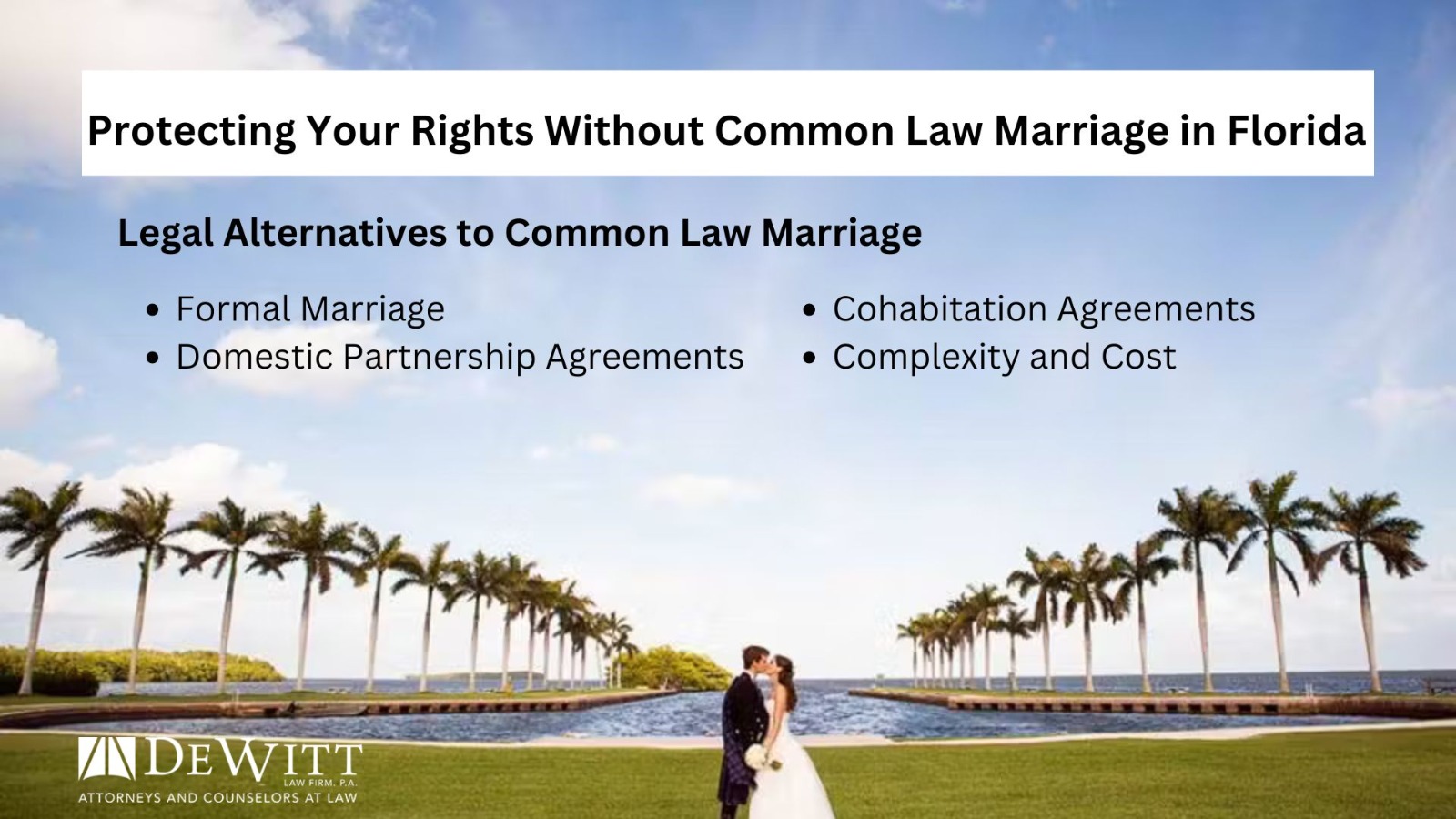Introduction
Common law marriage is a term that many have heard but few fully understand. It refers to a relationship where a couple lives together for a period and presents themselves as married without formally registering their union through a marriage license or ceremony. This concept holds significant importance in various jurisdictions across the United States, but its relevance and recognition vary widely, especially in Florida. At Dewitt Law, we specialize in family law and are well-versed in the nuances of common law marriage, providing expert legal advice and representation to those navigating these complex issues.
Historical Context of Common Law Marriage
The origins of common law marriage can be traced back to medieval England, where the formalities of marriage were less rigid, and cohabitation and public acknowledgment were sufficient to establish a marital relationship. Over time, this practice was carried over to the American colonies and eventually became part of the legal landscape in several states. However, as society and legal systems evolved, the recognition of common law marriage began to wane, with many states abolishing the practice altogether.
In Florida, common law marriage was recognized until 1968. However, changes in societal norms and legal frameworks led to the abolition of new common law marriages from that year onward. Understanding this historical context is crucial for grasping the current legal stance and implications of common law marriage in the state.
Legal Framework in Florida
Today, Florida does not recognize common law marriages formed within the state after January 1, 1968. This means that couples who begin living together in Florida after this date, regardless of how long they cohabit or how they present themselves publicly, cannot claim a legal common law marriage. The statutory laws governing marriage in Florida require couples to obtain a marriage license and have a formal ceremony to be legally recognized as married.
However, it’s important to note that Florida does recognize common law marriages that were legally established in other states where such unions are valid. This recognition is rooted in the Full Faith and Credit Clause of the U.S. Constitution, which requires states to honor the public acts, records, and judicial proceedings of other states.
Common Law Marriage Requirements
In jurisdictions where common law marriage is recognized, the requirements generally include:
- Cohabitation for a significant period
- Mutual agreement to be married
- Public presentation as a married couple
Since Florida does not recognize new common law marriages, these criteria are not applicable within the state. However, understanding these requirements can be helpful for couples who may have established a common law marriage in another state and later moved to Florida.
Case Studies and Precedents
There have been several notable cases in Florida involving common law marriages established in other states. These cases often revolve around issues such as property division, inheritance rights, and spousal support. One landmark decision is the case of Johnson v. Lincoln, where the Florida Supreme Court upheld the validity of a common law marriage established in Georgia, allowing the surviving spouse to claim inheritance rights.
Such precedents highlight the complexities and legal nuances involved in common law marriage cases and underscore the importance of expert legal representation in these matters.
Dewitt Law’s Perspective
At Dewitt Law, we bring extensive experience and a deep understanding of family law to our clients. Our practice areas encompass a wide range of issues, including marriage, divorce, child custody, and property disputes. Our team is dedicated to providing personalized and strategic legal advice, ensuring that our clients’ rights and interests are protected.
Our unique insights and approach to common law marriage cases stem from our thorough knowledge of both Florida laws and the broader legal landscape. We are committed to helping clients navigate the often-confusing legal terrain of common law marriage, providing clarity and peace of mind.
Challenges and Misconceptions
One of the most common misconceptions about common law marriage in Florida is that simply living together for a certain number of years automatically creates a legally recognized marriage. This is not the case. Couples may believe they have the same legal rights as formally married couples, only to face significant legal challenges when issues such as separation, death, or property disputes arise.
Another challenge is the lack of awareness about the legal differences between common law marriage and other forms of legal unions such as domestic partnerships and civil unions. Understanding these differences is crucial for couples to make informed decisions about their relationships and legal protections.
Recognition of Common Law Marriages from Other States
While Florida does not permit new common law marriages, it does recognize those established in states where they are legal. This interstate recognition can lead to complex legal situations, especially when couples move from a state that recognizes common law marriage to Florida. Legal complexities often arise in areas such as property rights, inheritance, and spousal support.
At Dewitt Law, we have handled numerous cases involving the recognition of out-of-state common law marriages. Our approach involves a thorough examination of the legal requirements and documentation from the state where the marriage was established, ensuring that our clients’ rights are upheld in Florida.
Alternative Legal Arrangements
For couples seeking legal recognition without traditional marriage, Florida offers alternatives such as domestic partnerships and civil unions. These arrangements provide certain legal benefits and protections similar to those of marriage, though they are not as widely recognized.
- Domestic Partnerships: Offer limited legal rights, primarily in areas such as health care decisions and hospital visitation.
- Civil Unions: Provide more comprehensive rights but are less common and not recognized in all jurisdictions.
Understanding these alternatives is important for couples to determine the best legal arrangement for their situation.
Legal Rights and Responsibilities
The legal rights and responsibilities of common law couples can vary significantly depending on whether their relationship is recognized. Key areas include:
- Property Rights: In states recognizing common law marriage, couples have rights similar to those of formally married couples regarding property acquired during the relationship.
- Custody and Child Support: Common law spouses have the same rights and obligations as traditionally married couples concerning child custody and support.
- Inheritance and Survivor Benefits: Common law spouses may be entitled to inheritance rights and survivor benefits, although these can be contested if the marriage is not legally recognized.
Legal Advice and Consultation
Navigating the legal complexities of common law marriage requires expert legal advice. At Dewitt Law, we offer comprehensive consultation services to help clients understand their rights and options. Whether dealing with property disputes, custody issues, or inheritance claims, our team provides personalized guidance to ensure the best possible outcome.
Preventive Measures and Legal Planning
Proactive legal planning is essential for couples in common law relationships or those considering alternative legal arrangements. Tips for legal protection include:
- Drafting cohabitation agreements
- Keeping thorough records of shared assets and contributions
- Consulting with a family law attorney to understand legal rights and responsibilities
Dewitt Law recommends taking these steps to safeguard your rights and avoid potential legal pitfalls.
FAQs
Does Florida recognize common law marriage? Florida does not recognize new common law marriages formed within the state after January 1, 1968. However, it does recognize common law marriages that were legally established in other states.
Is common law marriage legal in Florida? No, common law marriage is not legal in Florida if established after January 1, 1968. Couples must obtain a marriage license and have a formal ceremony to be legally married in the state.
What are the alternatives to common law marriage in Florida? Alternatives include domestic partnerships and civil unions, which provide certain legal benefits and protections.
How does interstate recognition of common law marriage work? Florida recognizes common law marriages established in states where they are legal. This recognition involves validating the marriage based on the laws of the state where it was formed.
What legal rights do common law couples have in Florida? Common law couples have limited legal rights in Florida unless their marriage was established in a state that recognizes common law marriage. These rights can include property division, custody, and inheritance, depending on the circumstances.
Conclusion
Understanding the nuances of common law marriage is crucial for couples in Florida. While the state does not recognize new common law marriages, those established in other states may still hold legal weight. At Dewitt Law, we are dedicated to providing expert legal advice and representation to help clients navigate these complex issues. If you have questions or need assistance with common law marriage or related legal matters, contact Dewitt Law for a consultation














